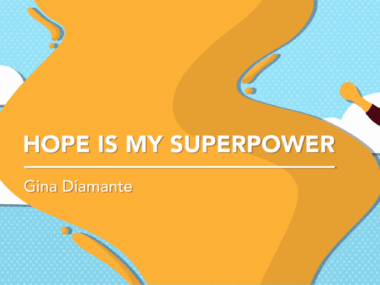Learning to reframe the stories we tell ourselves as caregivers
You don't have to believe all of the thoughts that cross your mind
Written by |

As a caregiver to my mum, who has myeloma, I usually experience some moments of quietness.
One of these moments might be when we’re driving home from the hospital. Or in the pre-dawn hours of the morning, when I’m struggling to sleep. During these quiet moments, my mind doesn’t rest because it’s busy telling itself stories like these:
“If I had pressed harder and gotten doctors to do that scan earlier, perhaps we might have caught it sooner.”
“I should be handling this situation much better. Maybe I’m just not strong enough.”
“Everybody else seems to know what they’re doing. Maybe I’m the only one who is pretending.”
All of these statements aren’t just random thoughts. They’re the silent, continuous commentary of my life as a caregiver. And one thing I’ve learned all this while is that the most important conversations I have aren’t with doctors, nurses, therapists, or oncologists. They’re the ones I have with myself.
Narratives that wear us down
The stories my mind tells itself usually follow familiar yet painful patterns that amplify the fears I have while minimizing my strengths. Here are some examples:
The story of guilt: These are thoughts that make me feel like every outcome is a direct result of a choice I did or did not make.
The story of inadequacy: These thoughts claim that a “good” caregiver isn’t supposed to ever feel tired, angry, or afraid.
The story of isolation: These thoughts make me feel like I’m alone in the struggle while everyone else is coping perfectly fine.
Of course, these narratives are not facts. Yet sometimes they feel true because what fuels them are both fear and love. And we all know that fear and love are two of the most powerful emotions humans have.
Questioning the plot
If you struggle with such thoughts and want to find peace, the first step isn’t stopping these stories from playing out in your mind. The first step is to start questioning them.
A therapist once taught me a powerful question to use during such moments: “What would I tell my best friend if they shared this story about themselves with me?”
Of course, my answer will always be kinder, truer, and far more compassionate than what I usually offer myself. I’m sure I’d respond with any of the following:
“You’re doing your best in an impossible situation.”
“You have no control over what the outcomes might be. However, you can show up with love.”
“Sometimes, it’s OK to be a mess. But that doesn’t make you a failure. It makes you human.”
Rewriting the narrative
As a caregiver, I’ve discovered that we never get to choose the circumstances we face. However, we can choose the manner in which we tell the story through those circumstances.
As a result of this deeper insight, I’ve begun to practice rewriting my experiences. To better illustrate this, here are some of the rewrites I’ve recently done:
Old story: “I was angry and lost my temper. I am a very terrible person.”
New story: “I was overwhelmed. I have apologized. I am learning from my mistakes every day.”
Old story: “I am confused and don’t know what to do. I’m always failing.”
New story: “I am going to do my best and figure this out in real time. What I am doing is brave.”
This has nothing to do with positive thinking. It’s all about thinking accurately. It’s about using a compassionate portrait to replace a cruel caricature.
The mantra: You shouldn’t believe everything you think. Your mind isn’t a news reporter; it’s a storyteller.
A challenge for the quiet moments: The next time your mind tells you a harsh story about yourself, pause and then ask yourself, “Is this the truth? What is a truer, kinder version of this thought?”
Soon, you’ll start to see and understand that you don’t have to believe all of the thoughts that cross your mind.
Note: Rare Cancer News is strictly a news and information website about the disease. It does not provide medical advice, diagnosis, or treatment. This content is not intended to be a substitute for professional medical advice, diagnosis, or treatment. Always seek the advice of your physician or other qualified health provider with any questions you may have regarding a medical condition. Never disregard professional medical advice or delay in seeking it because of something you have read on this website. The opinions expressed in this column are not those of Rare Cancer News or its parent company, Bionews, and are intended to spark discussion about issues pertaining to rare cancer.





Leave a comment
Fill in the required fields to post. Your email address will not be published.